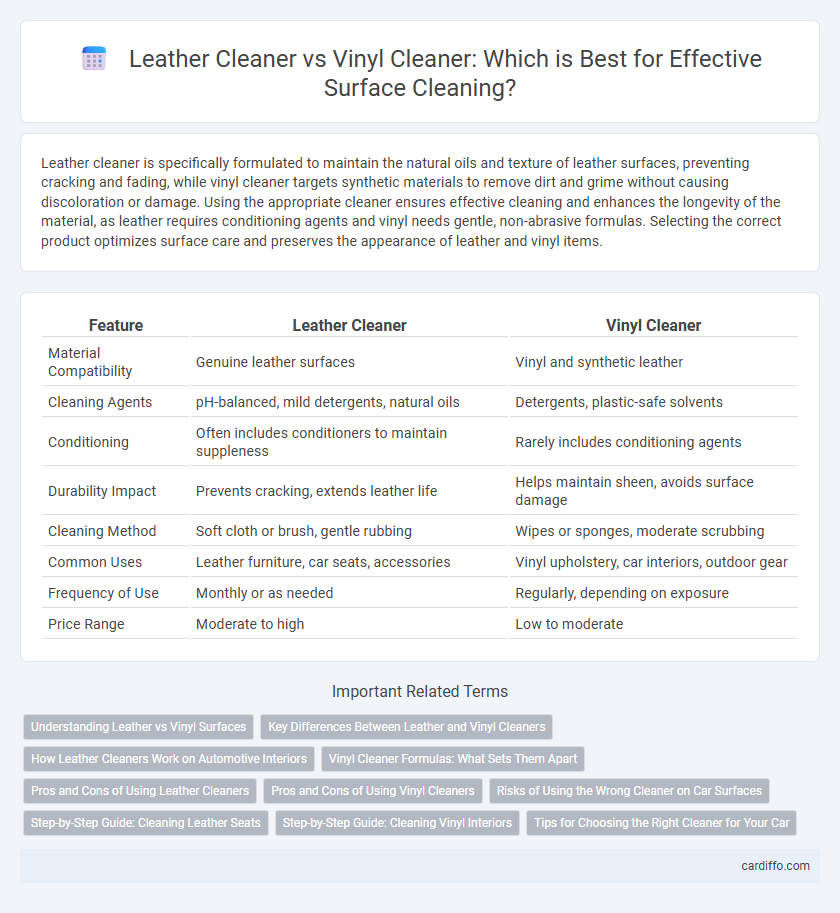Leather cleaner is specifically formulated to maintain the natural oils and texture of leather surfaces, preventing cracking and fading, while vinyl cleaner targets synthetic materials to remove dirt and grime without causing discoloration or damage. Using the appropriate cleaner ensures effective cleaning and enhances the longevity of the material, as leather requires conditioning agents and vinyl needs gentle, non-abrasive formulas. Selecting the correct product optimizes surface care and preserves the appearance of leather and vinyl items.
Table of Comparison
| Feature | Leather Cleaner | Vinyl Cleaner |
|---|---|---|
| Material Compatibility | Genuine leather surfaces | Vinyl and synthetic leather |
| Cleaning Agents | pH-balanced, mild detergents, natural oils | Detergents, plastic-safe solvents |
| Conditioning | Often includes conditioners to maintain suppleness | Rarely includes conditioning agents |
| Durability Impact | Prevents cracking, extends leather life | Helps maintain sheen, avoids surface damage |
| Cleaning Method | Soft cloth or brush, gentle rubbing | Wipes or sponges, moderate scrubbing |
| Common Uses | Leather furniture, car seats, accessories | Vinyl upholstery, car interiors, outdoor gear |
| Frequency of Use | Monthly or as needed | Regularly, depending on exposure |
| Price Range | Moderate to high | Low to moderate |
Understanding Leather vs Vinyl Surfaces
Leather surfaces require cleaners formulated with moisturizers and pH-balanced ingredients to maintain their natural oils and prevent cracking, whereas vinyl surfaces benefit from cleaners designed to remove dirt and grime without stripping protective coatings. Leather is porous and can absorb liquids, necessitating gentle, conditioning products, while vinyl's non-porous, synthetic nature allows for more robust cleaning agents that resist fading and cracking. Recognizing these material differences is essential for selecting effective leather or vinyl cleaners that preserve texture, appearance, and durability.
Key Differences Between Leather and Vinyl Cleaners
Leather cleaners contain natural oils and pH-balanced formulas that maintain leather's softness and prevent cracking, while vinyl cleaners focus on breaking down surface dirt and grime without causing discoloration. Leather products often require conditioning agents to preserve flexibility, whereas vinyl cleaners prioritize removing mildew and stains due to vinyl's synthetic composition. The chemical composition of each cleaner reflects the distinct material properties, with leather cleaners being gentler and vinyl cleaners more abrasion-resistant.
How Leather Cleaners Work on Automotive Interiors
Leather cleaners for automotive interiors use specially formulated enzymes and moisturizers to break down dirt and oils embedded in the leather's pores without causing damage. These cleaners maintain the leather's natural oils and flexibility, preventing cracks and fading over time. Unlike vinyl cleaners, which often rely on harsher chemicals for non-porous surfaces, leather cleaners balance effective cleaning with conditioning to preserve the material's durability and appearance.
Vinyl Cleaner Formulas: What Sets Them Apart
Vinyl cleaner formulas are specifically designed with gentle surfactants and plasticizers to maintain the flexibility and durability of vinyl surfaces without causing cracking or discoloration. Unlike leather cleaners that often contain conditioners and oils to preserve natural fibers, vinyl cleaners focus on removing dirt, grime, and stains while protecting UV resistance and preventing surface degradation. The chemical composition of vinyl cleaners ensures compatibility with synthetic materials, making them suitable for automotive interiors, upholstery, and outdoor furniture.
Pros and Cons of Using Leather Cleaners
Leather cleaners provide deep conditioning and maintain the natural texture and flexibility of leather, preventing cracking and prolonging its lifespan. However, they can be harsh if overused, potentially causing discoloration or residue buildup on sensitive materials. Using leather cleaner requires careful application and compatibility checks, as improper use may damage the finish or reduce leather's breathability.
Pros and Cons of Using Vinyl Cleaners
Vinyl cleaners effectively remove dirt, stains, and grime from vinyl surfaces while preserving their flexibility and preventing cracking over time. However, some vinyl cleaners contain harsh chemicals that can cause discoloration or surface damage if used excessively or improperly. Choosing a pH-balanced vinyl cleaner ensures safe maintenance and prolongs the lifespan of vinyl upholstery and accessories.
Risks of Using the Wrong Cleaner on Car Surfaces
Using the wrong cleaner on car surfaces, such as applying leather cleaner on vinyl, can cause discoloration, surface cracking, and material degradation. Leather cleaners often contain oils and conditioners that may leave vinyl surfaces sticky or slippery, increasing wear and attracting dirt. Vinyl cleaners typically have harsher chemicals unsuitable for leather, potentially leading to drying out and loss of suppleness in leather seats.
Step-by-Step Guide: Cleaning Leather Seats
Begin by vacuuming the leather seats to remove dust and debris, preventing scratches during cleaning. Apply a specialized leather cleaner evenly using a microfiber cloth, gently massaging the product into the surface to break down dirt and oils. Wipe off excess cleaner with a clean, damp cloth and finish by conditioning the leather to restore moisture and maintain suppleness.
Step-by-Step Guide: Cleaning Vinyl Interiors
To clean vinyl interiors effectively, begin by vacuuming the surface to remove loose dirt and debris. Apply a vinyl cleaner using a soft cloth or sponge, scrubbing gently to avoid damaging the material. Rinse with a damp cloth and dry thoroughly to prevent moisture buildup and maintain the vinyl's durability.
Tips for Choosing the Right Cleaner for Your Car
Selecting the right cleaner for your car involves understanding the material composition of your interior surfaces, as leather requires a pH-balanced cleaner with moisturizing properties to prevent cracking, while vinyl demands a cleaner with UV protection to avoid fading and cracking. Testing a small, inconspicuous area before full application ensures compatibility and prevents damage. Regular use of specialized leather or vinyl cleaners maintained with appropriate conditioning products extends the lifespan and appearance of your car's interior.
Leather cleaner vs Vinyl cleaner Infographic

 cardiffo.com
cardiffo.com